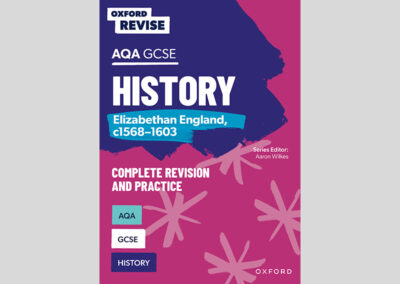AQA GCSE History: Elizabethan England, c1568–1603 Glossary
The key vocabulary you need to learn for your AQA GCSE History: Elizabethan England, c1568–1603 paper. Find all the terms and definitions you need to understand, from ‘almshouse’ to ‘undeserving poor’.
A - D (Almshouse to 'deserving poor')
almshouse
An almshouse is a charity building established to provide food and rest for the poor.
beacon
A beacon is a bonfire placed at strategic, visible locations to spread warnings of attack.
Catholic
A Catholic is a Christian person who follows the leadership of the Pope in Rome.
circumnavigate
To circumnavigate is to travel all the way around something.
colony
Colonies are lands under the full or partial control of another country, which occupies them using settlers from that country.
Counter-Reformation
The Counter-Reformation is the reform movement in the Catholic Church that took place in the sixteenth and seventeenth centuries, in response to the Reformation.
‘deserving poor’
The ‘deserving poor’ are people who were considered to be poor through no fault of their own, for example because they were sick or disabled, or were unable to find work.
E - H (Enclosing land to house of correction)
enclosing land
Enclosing land is the division of open shared fields into smaller fields, dividing one from another by barriers.
excommunication
Excommunication is to be officially removed from the Catholic Church by order of the Pope.
fireship
Fireships are burning ships sent into an enemy fleet or harbour.
gentry
The gentry are a high social class ranked below the nobility; they might be Justices of the Peace (JPs) or hold similar office.
house of correction
A house of correction is a place where beggars and those who refused to work were forced to spend the night as a punishment.
L - N (Line of battle to nobility)
line of battle
A line of battle is a naval tactic used in battle ships line up to create a long wall of canon fire.
martyr
A martyr is someone who has died for their religious beliefs.
militia
A militia is a non-professional army raised to fight for a particular cause, for example to defeat a rebellion or fight a war.
missionary
A missionary is someone whose aim is to spread their religious faith.
monopoly
A monopoly is the exclusive right to trade in a particular product.
MP
MP stands for Member of Parliament; in Elizabethan England wealthy landowners voted for MPs.
mutiny
A mutiny is a rebellion of sailors against the ship’s commanding officers.
nobility
The nobility is the highest social class with titles such as earl, duke, lord, and lady; the most respected members of society, who were given special rights and privileges and owned most of the land.
P (Papal bull to Puritan)
papal bull
A papal bull is a special message issued by the Pope.
patron
A patron is someone who funds the work of an artist or performing group.
patronage
A patronage is land, titles or power given to ensure an individual’s support.
Presbyterian
A Presbyterian is a person in the Protestant Church that believes bishops should be replaced by elders.
privateer
A privateer is a ship’s captain with royal permission to attack foreign ships.
Privy Councillor
Privy Councillors are members of the Privy Council, the most powerful lords appointed by Elizabeth to help her rule.
prophesyings
Prophesyings was the practice of Protestant clergy holding meetings that usually involved criticising the Church of England under Elizabeth I.
Protestant
A Protestant is a Christian person who protested against the Catholic Church
Puritan
Puritans are radical Protestants who wanted to ‘purify’ the English Church.
R - U (Reformation to 'undeserving poor')
Reformation
The Reformation is the sixteenth-century religious movement that saw the Church in Europe break into Catholicism and Protestantism; the ‘English Reformation’ refers to Henry VIII’s Break from Rome.
Renaissance
The Renaissance is the ‘rebirth’ or revival of European culture during the fifteenth and sixteenth centuries, when artists and writers rediscovered ideas from ancient Greek and Roman civilisations.
royal court
The royal court consisted of the nobles, advisors, government officials, ladies-in-waiting, and servants who surrounded the monarch.
ruff
A ruff is an item of clothing worn around the neck.
seminary
A seminary is a training college for priests.
Spanish Armada
The Spanish Armada is the fleet of Spanish ships sent to attack England in 1588.
spymaster
Often used to describe Francis Walsingham, who controlled a huge network of spies across England during Elizabeth I’s reign.
surplice
A surplice is a white gown worn by priests in the Church of England.
transubstantiation
The term transubstantiation refers to the Catholic belief that the bread and wine physically become the body and blood of Jesus Christ during Mass.
treason
Treason is an attempt to kill or overthrow the monarch or betray the country; a crime punishable by death.
‘undeserving poor’
The ‘undeserving poor’ are people living in poverty who tried to trick others out of their money or refused to work when they were able to.
